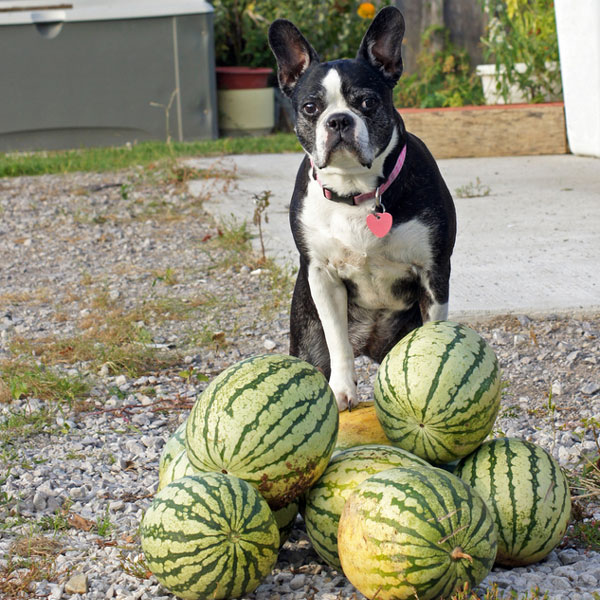Not a day goes by that I don’t read an article, essay, blog post, or tweet about what foods are bad for people to eat, along with a spate of posts and thinkpieces arguing that those same foods are good for you. Likewise, the Internet is awash in information, somewhat more useful, about the varieties of people-food that are both good and bad for dogs to eat. Dogs, as you may know, from their feral origins, are natural scavengers and omnivores at heart. As such, they will eat anything given half the chance.
Fruit is nature’s candy. Whether it’s succulent, tart, sweet, watery, or fleshy; whether it’s with or without seeds, from the tree or the vine; I’m sure it’s occurred to you to wonder, what fruits can dogs eat? Can dogs eat fruit? Dogster has the lowdown on some of the most popular fruits and whether they’re safe for your dog to enjoy at snack, treat, or mealtime.

Can dogs eat grapes?
This is one of the most common dog-fruit questions out there, and for good reason. The simple answer is “no.” For reasons that remain almost completely obscured to science, dogs experience violent adverse effects when they eat either grapes or their shriveled cousins, raisins. Purple or green, seeded or seedless, it doesn’t seem to matter. Within mere hours of ingesting grapes or raisins, dogs have been observed to begin having fits of vomiting and excessive urination. Within just a few days, dogs have experienced kidney failure, lapsed into comas, and died from eating grapes.
If you see your dog eat some grapes, the best course of action is to proceed directly to a veterinarian, who will induce vomiting. Not all dogs react in this way to grapes or raisins, but is it really worth taking the chance? Since the cause of dogs’ reaction to grapes is unknown, it is best to keep grapes, raisins, or any of their products or byproducts completely away from all dogs.
Can dogs eat bananas?
Yes, absolutely, if your dog has the desire and a taste for a nice, peeled banana, then feel free to allow your dog to eat it in moderation.

Can dogs eat apples?
Yes; dogs may not particularly care for the outer skin of an apple, but as long as the seeds are removed, apples are safe for dogs to eat. As you’ll see, with many fruits, seeds, cores, stems, or pits often contain chemicals that are toxic to dogs.
Can dogs eat pears?
Same as above with apples, with all the associated warnings about seeds and cores.
Can dogs eat oranges?
Another yes. Oranges, peeled and de-seeded are fine for dogs. Aside from the reactions that many of us have in eating lemons and limes, which dogs share, even the sourest citrus fruit seems to work okay for dogs, if they’re so inclined.
Can dogs eat peaches?
No! The flesh of a peach is delicious, no one questions that. However, the pit of a peach contains cyanide, which is deadly to pretty much everyone. Cynaide may seep out from the pit into the tender peach meat that is closest to the center. The same can be said of plums and other fruits with a solid, centralized core or seed at the center. The risk to a dog’s digestive tract is also high with pitted fruits. Aside from the natural poison in the core, that seed is large enough to obstruct or block the intestines of your dog. Thinking of canned peaches? Probably better to avoid store-bought canned fruits and fruit-cups, too, which often contain way more sugar than a dog is normally accustomed to processing.

Can dogs eat watermelon?
Yes, dogs can eat watermelon with no problems. It is advised that you remove the seeds before giving your dog a taste of watermelon, though. Better safe than sorry. Let’s take a look now at a few popular berries.
Can dogs eat strawberries?
Yes. You should probably remove the leaves and any stem that remains on top of the strawberry.
Can dogs eat blueberries?
Yes again! I wouldn’t recommend giving your dog a whole bowl of them, but a few here and there are more than acceptable, as long as the dog likes them!
Can dogs eat raspberries?
Another yes, with the same conditions. Dogs aren’t accustomed to the sugar content even of normal, non-canned fruits, so as long as it’s a special treat and not the entire meal, these berries are okay by dogs. Let’s look now at a few fruits that are from a bit further afield than these grocery store staples.

Can dogs eat pineapple?
Yes, pineapples are fine for dogs, provided, of course, you’ve removed the prickly outer husk of this island favorite.
Can dogs eat mango?
Mango is one of those fruits with a pit large enough to cause digestive blockages and with toxic contents. Peel the thick mango skin and remove the pit, and your dog may enjoy a bit of tender mango flesh.
Can dogs eat coconut?
Both the coconut meat and milk are all right for dogs, as long as they don’t have too much of either.

Does your dog eat fruit?
One caveat, of course, even for the fruits that are safe for dogs, is everything in moderation. In John Steinbeck’s novel The Grapes of Wrath, one thing that still sticks in my mind is that eating too much fruit — in the absence of other foods during the Great Depression — often gave characters recurring bouts of “the skitters.”
Does your dog eat fruit? What fruits do your dogs seem to enjoy the most, if any? Are there fruits aside from those mentioned above that you’re curious about? Starfruit, perhaps? Or are you a “we call it dog food because it is food for dogs” traditionalist? Share your dog’s favored fruits in the comments!
Learn more about dogs with Dogster:
- The 10 Biggest Misconceptions About Guide Dogs for the Blind
- 6 Things to Remember When You Have a Fearful Dog
- Four Things You Should Know About Your Dog’s Growl
The post What Fruits Can Dogs Eat? appeared first on Dogster.
No comments:
Post a Comment